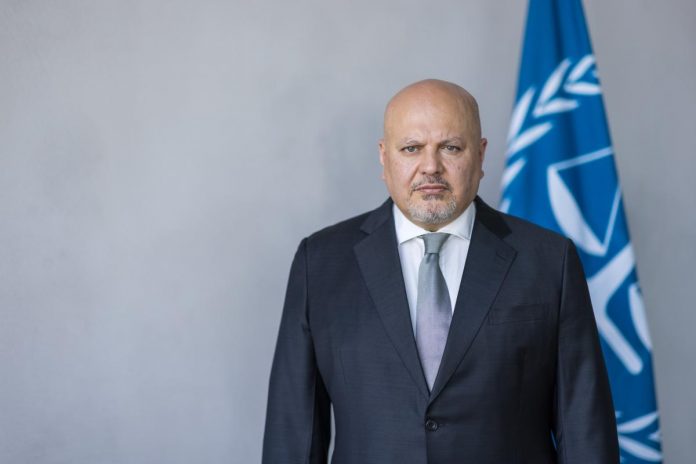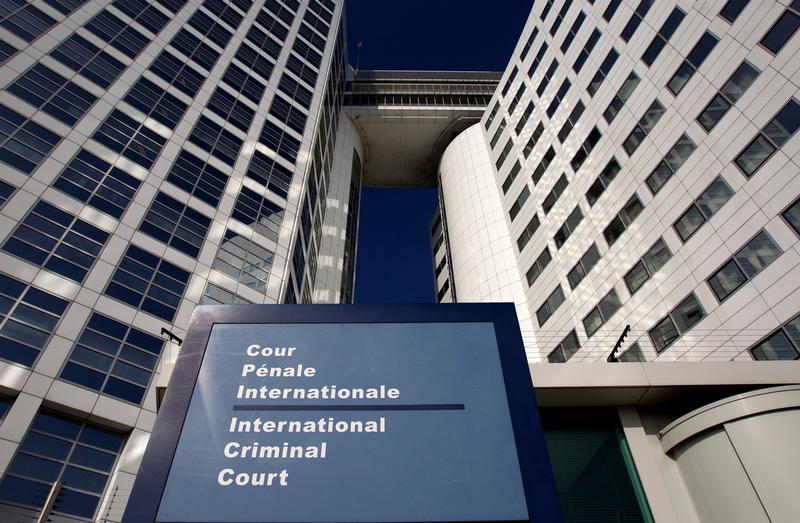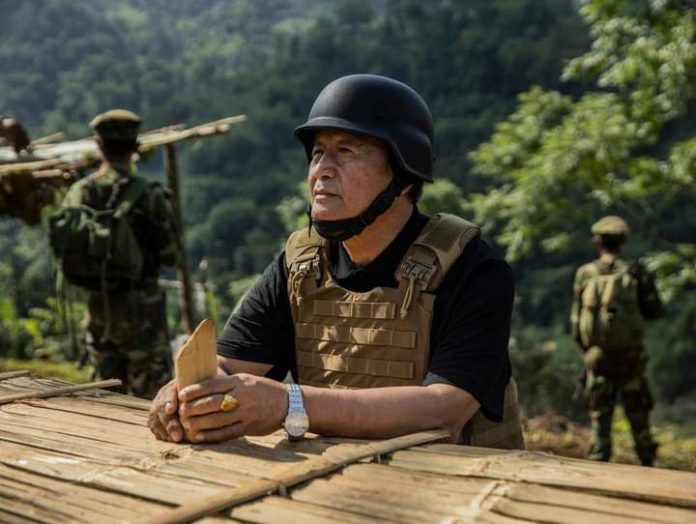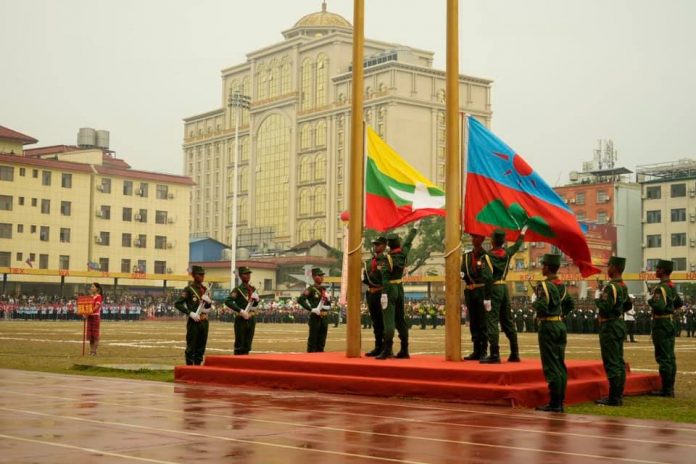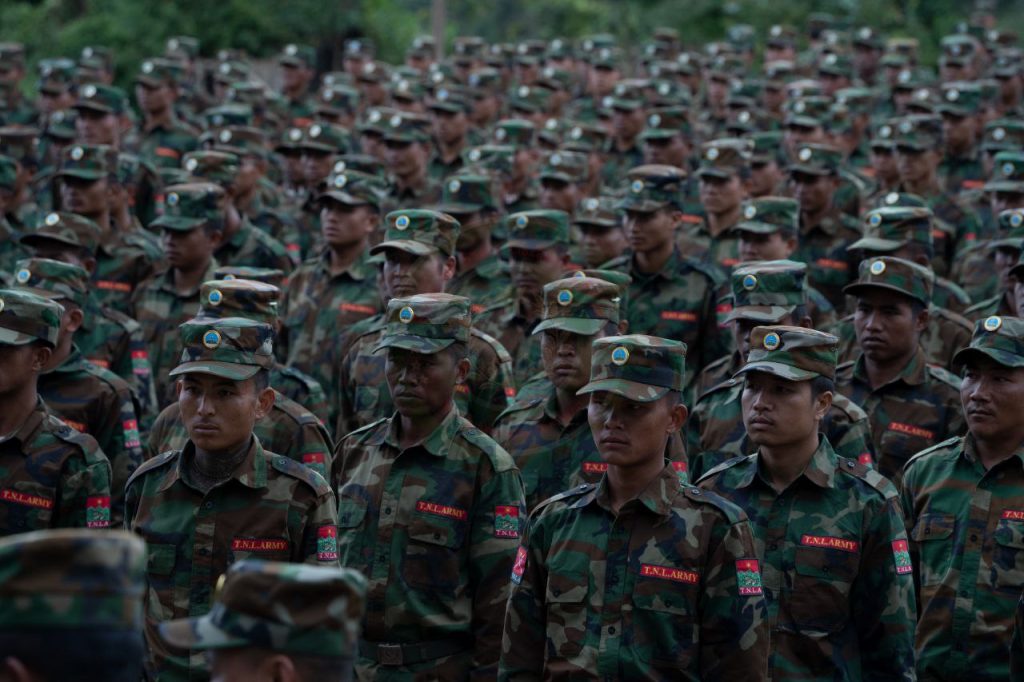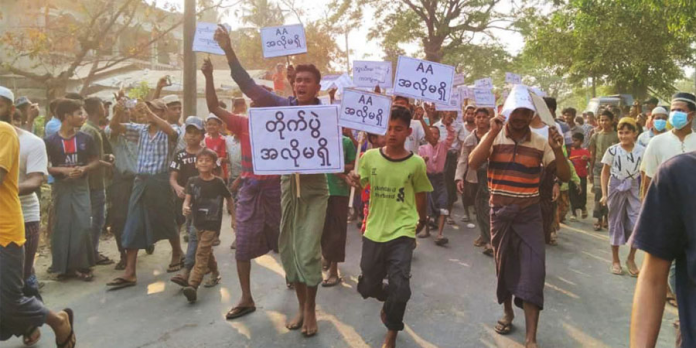Guest contributor
Moe Gyo
While the United League of Arakan/Arakan Army (ULA/AA) has made significant strides in liberating much of Arakan (Rakhine) and southern Chin states from the Myanmar military, it now faces an increasing threat from Rohingya militant factions operating in northern Arakan.
The ULA/AA has primarily focused its efforts on fighting the military, not generally engaging offensively with them. These militant factions – the Arakan Rohingya Salvation Army (ARSA), Rohingya Solidarity Organization (RSO), and Arakan Rohingya Army (ARA) – have allied themselves with the military against the ULA/AA, particularly in the areas of Maungdaw and Buthidaung townships, which have come under the increasing control of the ULA/AA.
The Rohingya militants have established a strong presence both in the Rohingya refugee camps and other areas in the Chittagong Division of Bangladesh. Their activities there continue to be marked by extortion, beatings, rapes, and other forms of violence and criminal activities against the Rohingya refugees in the camps.
They also engage in drug and human trafficking along the Myanmar-Bangladesh border. Yet, these militants receive tacit support from some sympathetic individuals within the Bangladesh Army (BA), Bangladesh Armed Police Battalion (BAPB), Border Guard Bangladesh (BGB), Bangladesh Directorate General of Forces Intelligence (BDGFI), and various local authorities in Chittagong.
The Rohingya militant factions have also garnered financial and political backing from certain Rohingya diaspora organizations which have not only provided funds, but also report, through the international media, unsubstantiated human right violations allegedly committed by the ULA/AA. Yet, they have largely overlooked the human right violations and criminal activities of the Rohingya militant factions both in the refugee camps and northern Arakan.
Despite condemning the military’s actions in 2017, these organizations have not extended the same level of condemnation to the Rohingya militant factions allied with it. This is the same miliary that carried out large-scale violence – murders, rapes, looting, and destruction of homes, fields, and livestock – and the ethnic cleansing of the Rohingya and forced hundreds of thousands to escape to Bangladesh.
These Rohingyas now live in crowded refugee camps, unwanted by the host Bangladesh community and preyed upon by the Rohingya militant groups and local authorities. The cooperation of the Rohingya militant factions with the military raises the question of why they, when their people have historically been victims of brutal state-sponsored crackdowns, would choose to collaborate with the same military.
Historically, the Rohingya have sought greater autonomy, and some factions within their political and religious leadership have aimed to create their own state in Myanmar or an autonomous region in Arakan. This aspiration dates back to the post-independence period of Burma in 1947 when the Rohingya’s request to join the newly-formed East Pakistan (modern-day Bangladesh) was rejected by Muhammad Ali Jinnah, the soon-to-be founding president of Pakistan.
Later in 1961, Burma created the Mayu Frontier Administration (MFA), administered by the Tatmadaw. However, it was dismantled in 1963 due to fears by the military government that the MFA would lead to a formal recognition of the Rohingya as a distinct ethnic group with their own autonomous and administrative area. The Rohingya have consistently linked land rights with ethnic recognition, political autonomy, and citizen rights.
Given this historical backdrop, it is a possibility that the Tatmadaw has made an “understanding” with these Rohingya militant factions, offering them a Special Region or Self-Administrative Zone in exchange for their support to fight the ULA/AA. This approach would not be unprecedented, as divide-and-conquer tactics have been used in Burma over the years to co-opt various ethnic armed organizations (EAOs) by offering them concessions such as territorial control.
A similar informal agreement with the Rohingya militants would allow the Tatmadaw to better address threats from the ULA/AA. Furthermore, it is conceivable that the Bangladesh Army would implicitly support such an arrangement so as to provide a buffer zone in Arakan for Rohingya refugees and address any adverse consequences arising from any potential creation of an independent Arakan country.
This “understanding” may also serve to align the interests of some overseas Rohingya organizations with those of the Rohingya militant factions to achieve some form of territorial and political self-autonomy in Arakan, leading to a recognition of the Rohingya identity.
It has been reported that in early November, there was a meeting in the Bandarban District of Bangladesh with representatives of ARSA, RSO, ARA, and four Islamic Mahaz groups. The aim was to agree upon a unified approach toward their operations and ultimate objectives in northern Arakan.
Furthermore, the Bangladesh Directorate General of Forces Intelligence was said to be involved with meetings with the RSO. These events reflect the increased escalation of militancy and the involvement of Bangladesh to further destabilize northern Arakan toward some form of self-autonomy with Bangladesh as its patron. This would mirror the situation in northern Shan State with China acting as the patron of the key EAOs based there.
The emergence of the Rohingya militancy in northern Arakan, reportedly supported by elements within the Bangladeshi security sector, presents a significant challenge for the ULA/AA, which now not only faces the Tatmadaw, but also the growing threat from these Rohingya militant factions based in Bangladesh. In this complex and volatile environment, the ULA/AA must carefully consider its diplomatic, political, and military options to manage the Rohingya militant threats while continuing its primary focus on defeating the Tatmadaw. Some responses available to the ULA/AA include:
Diplomatic and political
- Refuse to Engage in Repatriation Discussions: In this approach, the ULA/AA refuses to engage in discussions with Bangladesh over the repatriation of Rohingya refugees unless it undertakes actions to eliminate the Rohingya militant factions within the camps and their training and staging areas situated elsewhere inside Bangladesh. This would also apply international pressure on Bangladesh to curb the militants.
- Leverage Diplomatic Pressure on Bangladesh: Similarly, the ULA/AA seeks support from international actors, such as China, India, and the United Nations, to pressure Bangladesh to deal with the Rohingya militant factions within its borders and cease any government support of these factions. China, in particular, has a strategic interest in regional stability and could potentially provide diplomatic backing for such an initiative.
- Designate Rohingya Militant Factions as “Foreign Terrorist Organizations”: The ULA/AA provides evidence and facts to support the placement of the Rohingya militant factions on the “Foreign Terrorist Organizations” listing of foreign countries. This action would seek to pressure those overseas Rohingya organizations, aligned with the Rohingya militant factions, to halt their funding and other forms of support. Bangladesh could also see the adverse effects of this action in the periodic country reports by the international community.
- Investigate Reported Human Right Violations by the ULA/AA: Impartial international human right organizations are invited by the ULA/AA to investigate human right violations reported to be committed by soldiers of the ULA/AA. These investigations would lead to the prosecution of any ULA/AA soldiers committing such violations and respond directly to the claims of overseas Rohingya organizations.
- Close the Border to Trade: Economic leverage is used to pressure Bangladesh to take stronger action against the Rohingya militants, although it may also negatively impact the local economies on both sides of the border.
- Integrate the Rohingya into the Arakan People’s Revolutionary Government (APRG): A longer-term solution involves integrating the Rohingya into a broader political framework such as the APRG, which would provide them with political representation and a stake in the governance of a peaceful Arakan State or an independent Arakan country.
Military
- Forming Rohingya Battalions and Border Guard Forces: Local Rohingya battalions are formed, trained, and deployed, under ULA/AA control, to monitor the Myanmar-Bangladesh border and otherwise prevent Rohingya militants from crossing into Arakan. This approach allows the ULA/AA to counteract these militants in a more timely and effective manner.
- Enhanced Surveillance and Border Control: The ULA/AA increases surveillance along the informal border crossings to better track insurgent movements. Deploying small, specialized surveillance teams and reconnaissance drones would help to detect militant incursions and enable more coordinated ULA/AA military responses, including “hot pursuits” of Rohingya militants, escaping across the border back into Bangladesh after attacks in northern Arakan.
- Incentivize Actors within the Bangladesh Directorate General of Forces Intelligence, Bangladesh Army, Bangladesh Armed Police Battalion, and Border Guard Bangladesh: The ULA/AA offers financial and other incentives to targeted members of the BDGFI, BA, BAPB, and BGB for essential and timely intelligence about the Rohingya military factions and their camps, and concerted action by their units against these militants both within the camps and elsewhere in Bangladesh.
- Attack Insurgent Camps Inside Bangladesh: The ULA/AA pursues a more aggressive strategy, targeting Rohingya militant camps inside Bangladesh where these militants are believed to be training and regrouping. However, such operations may provoke severe diplomatic tensions with Bangladesh and risk an escalation of the conflict.
The situation in Arakan State is deeply complex, shaped by historical grievances, ethnic strife, and a tangled web of political, diplomatic, and military considerations. The ULA/AA faces a delicate balancing act in managing the threat from the Rohingya militant factions while continuing its primary objective of defeating the military.
The choices available to the ULA/AA – whether diplomatic, political, or military – carry significant risks and consequences. Ultimately, any path forward will require careful coordination, not only within Arakan, but across the broader geopolitical landscape.
Achieving peace and stability in the region will require confronting difficult historical issues as well as addressing the legitimate aspirations of all ethnic groups in Arakan.
Moe Gyo is a political consultant and strategist working on the Thailand-Myanmar border.
DVB publishes a diversity of opinions that does not reflect DVB editorial policy. We’d like to hear what you think about this or any of our stories: [email protected]


